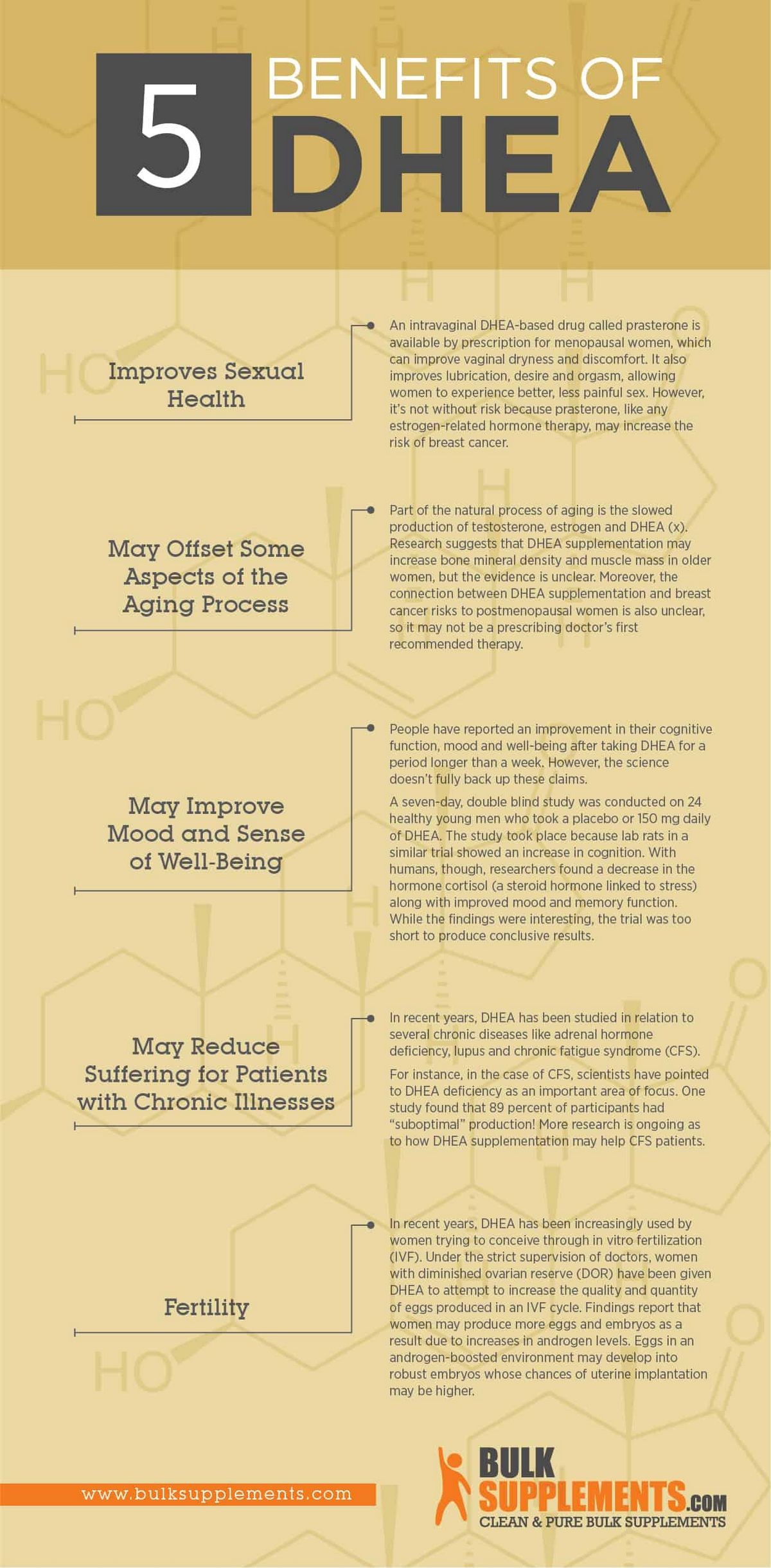
Contents
DHEA Herbal
Dehydroepiandrosterone (DHEA) is a hormone naturally produced by the adrenal glands, ovaries, testes, and brain. DHEA and its sulfated form DHEA-S have multiple functions in the body, including synthesizing male and female sex hormones.
DHEA levels decline with age, especially in women, who no longer produce sex hormones after menopause. People take DHEA oral supplements to relieve menopausal symptoms, adrenal insufficiency, depression, and slow down aging.
DHEA supplements are believed to increase estrogen and testosterone production, reduce cortisol (the stress hormone) levels, and improve the quality of life in older adults. It is also thought to help with depression, cognitive function, bone density, muscle strength, and lower cholesterol levels. However, current research shows no evidence that DHEA supplements can replicate the effects of natural DHEA in the body.
DHEA supplements are derived from diosgenin, a plant hormone found in wild yams from the Dioscorea species. However, taking wild yam extracts as a DHEA supplement is ineffective and unsafe, as diosgenin cannot be converted into DHEA in the human body. While some limited studies suggest potential benefits of DHEA for depression, aging skin, and fertility in women undergoing assisted reproduction, most of its supposed benefits are unverified.
DHEA supplements are available over the counter as oral tablets, capsules, and topical creams. The only FDA-approved prescription product is prasterone intravaginal insert, used to treat post-menopausal vaginal atrophy and dyspareunia. Athletes are prohibited from using DHEA products by the World Anti-Doping Agency. Common uses of DHEA include:
- Adrenal insufficiency
- Menopausal hot flashes
- Vaginal and vulvar thinning and dryness, and associated symptoms
- Osteoporosis (brittle bones due to bone mineral loss)
- Erectile dysfunction
- Slowing/reversing aging
- Cognitive disorders
- Depression
- Alzheimer’s disease
- Dementia
- Schizophrenia
- Immunostimulant
- Systemic lupus erythematosus (SLE), an autoimmune disorder
- Weight loss
- Anorexia nervosa
- Addison’s disease
- High cholesterol
- Inflammatory bowel disease
- Libido enhancement
- Infertility
- Improving insulin resistance
- Protection against heart disease
Warnings
Avoid taking DHEA supplements if you have any of the following conditions:
- Endometriosis
- Hormone-sensitive conditions
- Polycystic ovarian syndrome (PCOS)
- Uterine fibroids
- Ovarian cancer
- Uterine cancer
- Breast cancer
- Adrenal cancer
- Testicular cancer
Use DHEA with caution if you have the following conditions:
- Bipolar disorder
- History of mood disorder
- Depression
- Diabetes mellitus
- Impaired liver function
Avoid taking DHEA with medications metabolized by the enzyme CYP3A4.
DHEA supplements may be toxic to the liver, so avoid if you have liver disease.
High doses of DHEA may cause the body to stop producing natural DHEA.
What are the side effects of DHEA?
Common side effects of DHEA include:
- Acne
- Hair loss
- Abnormal male pattern hair growth in women (hirsutism)
- Menstrual irregularities
- Sexual inappropriateness
- Increased risk of hormone-sensitive tumors (with high doses)
- Deepening voice
- Nasal congestion
- Headache
- Fatigue
- Abdominal pain
- Decreased HDL cholesterol
- High blood pressure (hypertension)
- Fluctuations in blood glucose levels (hypoglycemia/hyperglycemia)
- Mania or hypomania
- Irritability
- Insomnia
- Psychosis
- Liver dysfunction
Contact your doctor immediately if you experience any of the following symptoms or serious side effects while using this drug:
- Serious heart symptoms such as fast or pounding heartbeats, fluttering in your chest, shortness of breath, and sudden dizziness
- Severe headache, confusion, slurred speech, severe weakness, vomiting, loss of coordination, feeling unsteady
- Severe nervous system reaction with very stiff muscles, high fever, sweating, confusion, fast or uneven heartbeats, tremors, and feeling like you might pass out
- Serious eye symptoms such as blurred vision, tunnel vision, eye pain or swelling, or seeing halos around lights
This is not a complete list of all side effects or adverse reactions that may occur from the use of this drug. Contact your doctor or seek medical advice from the FDA at 1-800-FDA-1088 for more information.
QUESTION
What are the dosages of DHEA?
Suggested dosing:
Adult:
Adrenal Insufficiency
- 20-50 mg orally once daily
- 50-100 mg orally once daily
Depression
- 30-90 mg orally once daily
- 50 mg orally once daily
- 200 mg orally once daily
- Up to 600 mg/day have been used
- 50 mg orally twice daily
Menopausal Hot Flashes
- 25-50 mg orally once daily
Vaginal Atrophy and Dyspareunia
- FDA approved prescription product: prasterone intravaginal
- Administer 1 vaginal insert once daily at bedtime using the provided applicator
Overdose
Overdosing on DHEA may intensify its side effects and increase the risk of serious adverse effects, including cancer. Treatment for overdose may include discontinuing DHEA and providing symptomatic and supportive care.
What drugs interact with DHEA?
Inform your doctor of all medications you currently take to check for possible drug interactions. Never begin taking, suddenly discontinue, or change the dosage of any medication without your doctor’s recommendation.
- DHEA has no severe interactions with other drugs.
- Serious interactions of DHEA include:
- dihydroergotamine
- dihydroergotamine intranasal
- dronedarone
- ergotamine
- erythromycin base
- erythromycin ethylsuccinate
- erythromycin lactobionate
- erythromycin stearate
- everolimus
- pimozide
- ranolazine
- silodosin
- sirolimus
- tolvaptan
The drug interactions listed above are not exhaustive. For more information on drug interactions, visit the RxList Drug Interaction Checker.
It is important to inform your doctor, pharmacist, or healthcare provider of all prescription and over-the-counter medications you use, including dosage, and to keep a record of this information. Consult your doctor or healthcare provider if you have any questions regarding medication.
Pregnancy and breastfeeding
- DHEA is possibly unsafe for pregnant or breastfeeding women, so avoid use.
- Consult your healthcare provider before taking any dietary supplement, including DHEA, if you are pregnant or breastfeeding.
What else should I know about DHEA?
- DHEA supplements are possibly safe for most adults when taken orally at recommended dosages for a short term or applied topically on the skin. Long-term safety of DHEA use has not been studied.
- Follow label instructions when using DHEA. Natural products are not always safe, and it is important to adhere to suggested dosing.
- Consult your healthcare provider before taking any dietary supplement, including DHEA, especially if you have any health conditions or are taking regular medication.
- Check the labels of DHEA products for information on their ingredients.
- DHEA is a dietary supplement and is not regulated by the FDA. Different products may have different formulations and strengths, and labels may not always accurately reflect contents. Use caution when choosing a DHEA product.
- Keep DHEA products out of reach of children.
- If an overdose occurs, seek medical help or contact Poison Control.
Summary
Dehydroepiandrosterone (DHEA) is a hormone naturally produced by the adrenal glands, ovaries, testes, and brain. People take DHEA oral supplements for various purposes, including relieving menopausal symptoms, adrenal insufficiency, depression, and slowing down aging. Common side effects of DHEA include acne, hair loss, abnormal male-pattern hair growth in women (hirsutism), menstrual irregularities, sexual inappropriateness, increased risk of hormone-sensitive tumors (with high doses), deepening voice, nasal congestion, headache, fatigue, abdominal pain, decreased HDL cholesterol, and others. Pregnant women should avoid taking DHEA.


